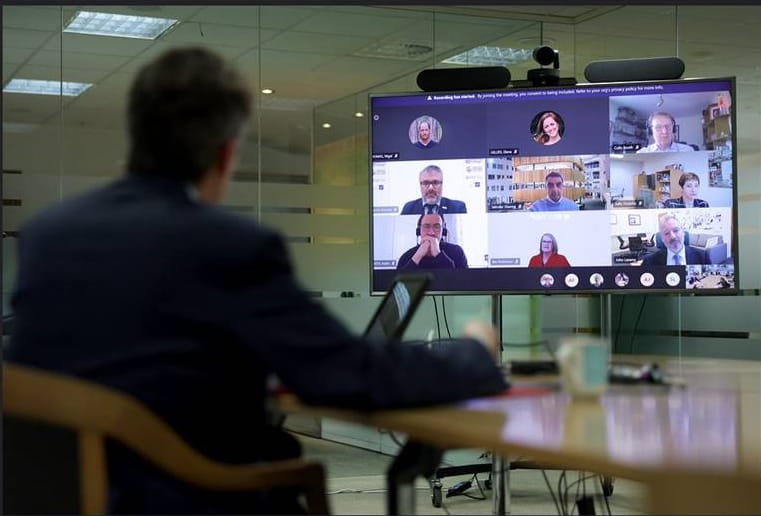Closing the skills gap: Walsall ahead of the curve for new Government agenda

Walsall and the West Midlands are ahead of the curve as the Department of Education releases its ‘blueprint for the future’ of Further Education, as Walsall College Principal and Chief Executive, Jatinder Sharma OBE explains.
As employers and businesses count the cost of COVID-19 and the long-term economic effects of 2020, it is easy to feel pessimistic about our economic outlook.
Walsall – already an area of economic and social deprivation, with a low-skills and low income economy – is likely to be hit especially hard by lockdown job losses in retail and hospitality. Whilst other sectors – such as healthcare and manufacturing – face skills shortages that collectively cost the UK £6.6b a year.
So it is with optimism and enthusiasm that Walsall College welcome the recent Government white paper – Skills for Jobs: Lifelong Opportunities for Learning and Growth.
Putting employers at the heart of the system
The white paper sets out the Government’s blueprint for putting employers at the heart of the Further Education system, so that post-16 training links more directly to locally in-demand skills and employment opportunities. It expands on the Government’s pledge of £1.5b to ‘invest in skills and invest in FE’ as part of the Build Back Better agenda.
Employers are to be involved in creating new ‘Local Skills Improvement Plans’ to help define local skills needs. Furthermore, employers will be invited to work more closely with Further Education to co-design and co-deliver curricula.
This is not currently the case with all Further Education providers, as the Secretary of State for Education recognises in the foreword to the white paper, saying:
‘There is no mechanism to understand and address the gaps that local areas face in skills provision. Employers and providers do not always work together to agree what skills are needed to meet local labour market demands.’
Here, I am pleased to say, Walsall College has been ahead of the curve. We are passionate advocates and long-time champions of employer engagement in education. We already work with key local partners – including employers such as the NHS, Balfour Beatty VINCI, Bell Group, Taylor Wimpey, Cisco and Barhale – to ensure our curriculum is effectively aligned to industry and economic needs.
Our high-quality courses are shaped to deliver the skills those businesses need to succeed and include opportunities for learners to prepare effectively for employment, such as industrial placements, work experience and employer-informed projects.
As a result, almost 90% of our curriculum is aligned with local skill priorities, providing a pipeline of talent to employers in our locality. Not only that, but 92% of our learners go on to positive destinations in employment or Higher Education.
However, facing deepening economic challenges, we want to do more to ensure the productivity and prosperity of the region. So we plan to strengthen and expand these partnerships with our ‘Employer in Every Classroom’ pledge.
We want every subject we offer to include input from real-world employers: from career talks and curriculum design, to work experience and professional projects.
For our students, it provides a clear line-of-sight to future opportunities and inspiration to work hard and succeed. For employers, it means access to talented candidates with in-demand skills and an understanding of their real-world application.
As we seek to rebuild the local economy, we will focus on priority sectors which have the highest potential for positive impact in the region. These include construction and building technologies, automotive and advanced manufacturing, business and professional services, digital skills, and of course those hardest hit by the pandemic – travel, tourism, hospitality and some of the creative industries.
The white paper also sets out the possibility of the new ‘Local Skills Improvement Plans’ to be led by local Chambers of Commerce; something to be trialled in key areas before wider rollout. I am eager to see how this will work, given my own existing involvement with local business groups.
As Principal of the College, I consider it my duty to hear directly from the businesses we seek to serve, in order to align their needs with our curriculum. Working with the Black Country LEP, Walsall Economic Board, Walsall Proud Partnership and local Chamber of Commerce, I see the benefits of Further Education engaging with business leaders first-hand.

Upskilling workers of every age and stage
The white paper also outlines a new £2.5 billion National Skills Fund, to support adults to upskill and reskill. This includes a pledge of £95m in 2021-22 to help all adults achieve their first full advanced level 3 qualification and loans to support four years of post-18 education.
To achieve this, it is essential that adult learners have access to learning and training opportunities that fit around their existing commitments. So flexibility and accessibility is an important theme of the Government’s vision for FE.
In-person and full-time attendance at university or college simply isn’t possible for everyone, such as in-work learners, those with caring commitments or people with disabilities. Here at Walsall College, regardless of their age or career stage, we’re committed to providing learners with the skills they need to progress and prosper in their chosen employment.
We offer hundreds of courses on a full-time and part-time basis, online, in the classroom and in the workplace. This provides 4,000 14-19 year-old students, 5,000 adult learners, 1,500 apprentices and over 200 HE students with a complete education solution: from no or low educational attainment, through GCSEs, BTECs, T Levels and apprenticeships, up to undergraduate and postgraduate degrees.
Whilst we already have more learners over the age of 19 than under it, we know many adult learners still face barriers to retraining and upskilling. So we are committed to improving access in the post-COVID landscape by providing a wide range of flexible courses, through different modes of delivery.
Indeed, one positive from Coronavirus has been the acceleration of digital transformation in education, with many colleges and universities forced to find ways to provide learning online. We will seek to build on this and harness the opportunity to do things differently for people who aren’t attracted to in-person learning, to unlock previously untapped talent and widen participation.
Another area of alignment between the Government white paper and Walsall College’s strategy is the provision of fundamental skills for success: English, Maths and digital literacy.
We believe that digital skills are the golden thread connecting all industries. Individuals and employers simply can’t succeed in the modern world without them. So digital skills – along with English and maths – will be embedded into every part of our curriculum.
We aim to be renowned for our expertise in the digital sector by giving students real career pathways into professions such as cyber security, robotics, computer sciences, artificial intelligence and big data, supported by a new digital demonstration facility serving the West Midlands.
In light of the ongoing crisis – alongside the needs and promises of the Build Back Better agenda –Further Education has never been more critical to the success of the economy.
We will have to wait for the details of the Strategic Development Funding promised in the white paper. Strategy is meaningless if not supported by investment for our chronically underfunded sector. However, I want to assure businesses, the public and the private sector that Walsall College intends to be at the forefront of this recovery agenda.
There will undoubtedly be many challenges ahead. But with the College’s proven success producing high-calibre job-ready graduates – and our continued determination, hard work and expertise – I have every confidence that we can and will Build Back Better together.
If you are a local employer I urge you to get involved now. Please contact us on 01922 657 000 or email businesstrainingsolutions@walsallcollege.ac.uk



